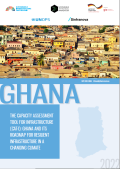A growing number of countries at all levels of development have legislation or regulations prescribing the application of Strategic Environmental Assessment (SEA) - and many more are introducing it as part of their policy tools. This is creating unique opportunities for better policy making and planning by incorporating environmental considerations into high-level decision-making and opening new mechanisms to build consensus on development priorities within governments themselves and between governments and societies.
Unlike case studies that concentrate on a particular SEA, this example seeks to explain how ideas about EIA, SEA and environmental mainstreaming have been progressively developed in Ghana over the last 20 years. By tracing the evolution of environmental assessment processes over an extended period, it is possible to show how significant changes of attitude and understanding have been introduced by SEA and related processes, and to discuss outcomes in environmental governance that are not immediately apparent from examining the performance of individual SEAs.

